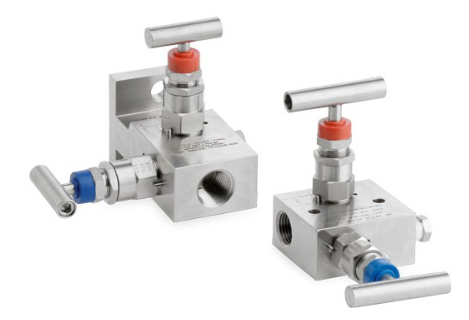
Guide for Manifold Valve Working, Benefits, and Application
July 29, 2024Instrument valves are essential for managing the flow of gases and fluids in a variety of industrial operations. Professionals working in sectors like oil and gas, chemical processing, pharmaceuticals, and power generation must have solid knowledge of the various types of instrument valves, as well as their uses, maintenance procedures, and functions. This in-depth manual will provide you with complete knowledge of instrument valves.
Types of Instrument Valves
Instrument valves come in a wide variety of forms, each designed for a particular use. Here are some of the most common kinds:
- Globe valves: Their distinctive features are their ascending stem and globe-shaped body. Their adaptability and capacity to offer accurate control over flow rates have made them highly applicable across many sectors.
- Gate valves: In a gate valve, the route is opened or closed by a flat disc that moves perpendicular to the direction of flow. They are usually employed in situations where a big flow area is needed or for on-off service.
- Ball valves: The spherical stopper of a ball valve has a hole in it. The flow can be controlled, opened, or closed by turning the plug. They are renowned for their low leakage and fast acting capabilities.
- Check valves: Check valves restrict flow to one direction, which prevents backflow. They are frequently employed in systems where reverse flow may result in harm or problems with functioning.
- Diaphragm valves: A flexible diaphragm is used by diaphragm valves to regulate flow. Applications requiring corrosive or abrasive fluids are appropriate for them.
- Pinch valves: Pinch valves regulate flow by pinching closed a flexible sleeve. They are frequently employed in situations where exact control is not necessary.
- Plug valves: The spinning plug of a plug valve has ports that either line up or out of alignment with the flow stream. They come in multi-port setups and are utilised for on-off service.
Functions of Instrument Valves
Instrument valves are used in many different industrial processes for various purposes, such as:
- Flow control: Gas and liquid flow rates are controlled via valves.
- Isolation: A process line’s individual parts can be isolated with valves for maintenance or inspection.
- Pressure relief: Pressure relief valves release extra fluid or gas, shielding equipment from high pressure.
- Sampling: Sampling valves are used to take fluid or gas samples for examination.
- Emergency shutdown: In the event of an emergency, process lines are rapidly isolated with the help of emergency shutdown valves.
Applications of Instrument Valves
Many different industries implement instrument valves, including:
- Oil and gas: Controlling the flow of gas, oil, and other fluids in pipelines, offshore platforms, and refineries requires valves.
- Chemical processing: Chemical flow is controlled by valves in a variety of processing facilities.
- Pharmaceuticals: In the pharmaceutical sector, valves are used to regulate the flow of goods and components.
- Power generation: In power plants, valves are used to regulate the flow of fluids such as water and steam.
- Food and beverage: In facilities that prepare food and beverages, valves are employed to regulate the flow of materials and finished goods.
Maintenance of Instrument Valves
Proper maintenance is crucial for ensuring the reliable and efficient operation of instrument valves. Regular maintenance tasks include:
- Inspection: Inspect valves regularly for signs of wear, corrosion, or damage.
- Lubrication: Lubricate valves as recommended by the manufacturer.
- Testing: Test valves periodically to ensure they are functioning properly.
- Calibration: Calibrate valves as needed to maintain accuracy.
- Replacement: Replace valves that are beyond repair.
By following these maintenance practices, you can help to prolong the life of your instrument valves and prevent costly downtime.
Conclusion
Instrument valves are crucial parts of numerous industrial operations. Experts in these fields must have solid knowledge of many kinds of valves, as well as their uses, maintenance needs, and functions. You may ensure the proper functioning of instrument valves and obtain a deeper understanding of them according to the guidance presented in this extensive guide.




